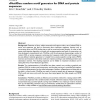Free Online Productivity Tools
i2Speak
i2Symbol
i2OCR
iTex2Img
iWeb2Print
iWeb2Shot
i2Type
iPdf2Split
iPdf2Merge
i2Bopomofo
i2Arabic
i2Style
i2Image
i2PDF
iLatex2Rtf
Sci2ools
BMCBI
2007
2007
rMotifGen: random motif generator for DNA and protein sequences
Background: Detection of short, subtle conserved motif regions within a set of related DNA or amino acid sequences can lead to discoveries about important regulatory domains such as transcription factor and DNA binding sites as well as conserved protein domains. In order to help assess motif detection algorithms on motifs with varying properties and levels of conservation, we have developed a computational tool, rMotifGen, with the sole purpose of generating a number of random DNA or protein sequences containing short sequence motifs. Each motif consensus can be user-defined, randomly generated, or created from a position-specific scoring matrix (PSSM). Insertions and mutations within these motifs are created according to user-defined parameters and substitution matrices. The resulting sequences can be helpful in mutational simulations and in testing the limits of motif detection algorithms. Results: Two implementations of rMotifGen have been created, one providing a graphical user in...
| Added | 08 Dec 2010 |
| Updated | 08 Dec 2010 |
| Type | Journal |
| Year | 2007 |
| Where | BMCBI |
| Authors | Eric C. Rouchka, C. Timothy Hardin |
Comments (0)

